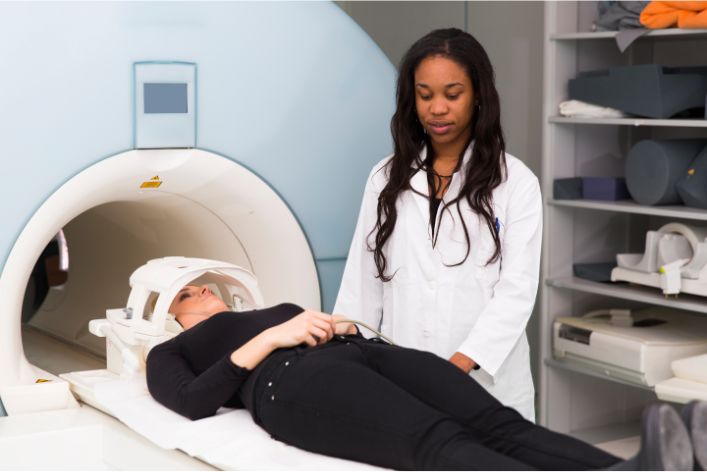Introduction
Radiology is a medical specialty that employs the use of imaging techniques to diagnose and treat diseases. It plays a critical role in healthcare, aiding in the management of various medical conditions.
Radiology is particularly essential in Nigeria, where access to quality healthcare is limited. The field is vast, encompassing various imaging techniques such as X-rays, CT scans, and MRI scans, among others.
The primary importance of radiology in healthcare is that it facilitates early and accurate diagnoses of medical conditions, enabling the timely initiation of treatment.
With technological advancements, radiology is becoming more accessible and affordable in Nigeria, improving the quality of healthcare.
Radiology in Nigeria is mainly situated in tertiary hospitals, but private radiology practices are emerging, increasing access to imaging services.
However, there is still a shortage of radiologists in the country, necessitating the development of training programs to bridge the gap.
Radiology in Nigeria faces several challenges, such as inadequate equipment, the need for upgrading facilities, and a lack of digital infrastructure for the transfer of images.
Nevertheless, the expansion of radiology services in Nigeria has significant potential to impact healthcare positively.
Overall, radiology is an indispensable facet of healthcare in Nigeria and a growing career choice.
Read: Healthcare Education in Nigeria: A Path to Profession
History of Radiology in Nigeria
Early Years of Radiology in Nigeria
Radiology was introduced to Nigeria in the 1930s with the establishment of the first X-ray unit in Lagos General Hospital.
The first radiographers in Nigeria were mostly Europeans who were brought in to operate the X-ray machines.
In the early years, radiology was mainly used for the diagnosis of bone fractures and tuberculosis, which was prevalent at the time.
Establishment of Radiology Societies in Nigeria
The Nigerian Society of Radiographers (NSR) was established in 1967 to represent the interest of radiographers in Nigeria.
In 1976, the National Postgraduate Medical College of Nigeria (NPMCN) was established to provide postgraduate training in radiology.
The Radiological Society of Nigeria (RSN) was also established in 1984 to promote the advancement of radiology in Nigeria.
Growth of Radiology in Nigeria
The growth of radiology in Nigeria can be attributed to the establishment of more radiology departments in hospitals across the country.
Radiology has become an integral part of healthcare in Nigeria and is used for the diagnosis and treatment of various medical conditions.
In recent years, there has been an increase in the number of private radiology practices in Nigeria providing specialized services.
The future of radiology in Nigeria looks promising with advancements in technology and increasing demand for healthcare services.
Read: Public Health in Nigeria: Bridging the Gap in Care
Current State of Radiology in Nigeria
Availability of Radiology Equipment and Technology
Radiology is a vital aspect of healthcare, and it requires that physicians have access to modern equipment and technology to accurately diagnose and treat their patients.
Unfortunately, this is not always the case in Nigeria. Although radiology equipment and technology have improved in recent years, the country still lags behind many developed countries.
There are only a few well-equipped radiology centers across Nigeria. This is due to the high cost of equipment.
Only a few government hospitals have the necessary equipment, and it is usually outdated and requires frequent maintenance.
Private hospitals are better equipped, but their services are expensive and out of reach for most Nigerians.
Role of Radiology in Nigerian Healthcare
Despite the current challenges facing radiology in Nigeria, the discipline plays a crucial role in the country’s healthcare system.
Radiology is involved in the diagnosis, treatment, and management of various medical conditions.
Medical professionals rely on radiology to analyze medical images and diagnose illnesses accurately.
Radiology serves as a bridge between multiple medical disciplines, providing support for physicians, surgeons, oncologists, and other healthcare professionals.
It is especially crucial in cancer treatment, where radiologists use imaging techniques to track the progress of cancerous tumors throughout the patient’s body.
Read: How to Become a Medical Lab Technician in Nigeria
Challenges Facing Radiology in Nigeria
Several challenges plague the practice of radiology in Nigeria, making it challenging for hospitals and medical professionals to provide comprehensive care. Some of the significant challenges include:
Lack of Skilled Personnel:
There is a shortage of adequately trained radiologists, radiographers, and other radiology technicians in Nigeria. This has led to hospitals employing untrained personnel, resulting in erroneous diagnoses with potentially fatal consequences.
Outdated Technology:
Most radiology equipment in Nigeria is outdated and requires frequent maintenance, resulting in delays and long wait times for patients seeking treatment.
High Cost of Equipment:
Radiology equipment is costly, making it challenging for hospitals and clinics in Nigeria to procure the necessary equipment. As a result, many hospitals rely on old and outdated equipment, affecting the accuracy of diagnoses.
Poor Funding:
The Nigerian government allocates minimal funding to healthcare, with only a small percentage of it going to radiology. This has led to inadequate staffing and poor infrastructure to support the discipline.
Poor Regulation:
The lack of proper regulation has led to the proliferation of sub-standard radiology centers in Nigeria.
This poses a significant risk to the health of patients, as they are susceptible to being misdiagnosed, mistreated, and exposed to harmful radiation levels.
In essence, Radiology is a critical aspect of Nigerian healthcare that requires proper investment in technology, equipment, and human resources to improve its efficacy.
The government needs to allocate more funds to healthcare, and regulatory authorities need to strengthen their oversight to ensure that radiology centers provide quality diagnostic and therapeutic services to Nigerians.
Read: The Role of Exercise Physiology in Nigeria’s Sports Industry

Career Opportunities in Radiology in Nigeria
Types of Radiology Careers in Nigeria
Radiology is a vital aspect of healthcare in Nigeria, and there are various career opportunities for individuals interested in this field. Here are some of the types of radiology careers in Nigeria:
- Radiologic Technologists: They perform diagnostic imaging tests using X-rays, computed tomography (CT), magnetic resonance imaging (MRI), and other imaging machines.
- Radiology Nurses: They assist the radiologist in performing procedures, administering contrast agents, and monitoring patients during imaging procedures.
- Radiation Therapists: They administer radiation treatment to cancer patients.
- Radiologists: They are physicians who interpret medical images to diagnose illnesses and injuries, as well as provide guidance for treatment.
- Sonographers: They specialize in imaging of the body’s organs and tissues using sound waves.
Education and Training Requirements for Radiology Careers in Nigeria
To pursue a career in radiology in Nigeria, the minimum education requirement is a bachelor’s degree in radiography or medical imaging science.
However, most employers prefer candidates with higher degrees like master’s or doctorate degrees.
The Radiographers Registration Board of Nigeria mandates certification for Radiologic Technologists and Radiology Nurses. They must also obtain licensure from the Medical Radiographers Board of Nigeria before practicing.
Radiation Therapists need additional training, including a one-year postgraduate diploma course in radiation therapy, before obtaining licensure and practicing in Nigeria.
Radiologists require extensive medical training, including a four-year degree in medicine, a one-year internship, and a five-year residency programme in diagnostic radiology.
Sonographers, on the other hand, require a degree in medical ultrasound or medical imaging science, and certification is also required for them to practice.
Salary Potential and Job Outlook for Radiology Careers in Nigeria
Radiology is a lucrative career in Nigeria, and the salary potential varies depending on the level of education and years of experience.
Radiologic Technologists and Radiology Nurses typically earn between N100,000 to N200,000 monthly, while Radiation Therapists earn an average of N500,000 monthly.
Radiologists, being physicians, have a higher earning potential with an average monthly salary of N3,500,000.
The job outlook for radiology careers in Nigeria is positive, with a projected growth rate of 7% by the year 2028.
As the population of Nigeria continues to increase, the demand for medical services will also increase, leading to more job opportunities for healthcare professionals, including radiologists.
Essentially, radiology presents various career opportunities in Nigeria, from Radiologic Technologists to Radiologists.
Pursuing a career in this field requires dedication, hard work, and continuous education and training to stay up-to-date with emerging trends and technology.
Read: The Inspiring Journey of Nigerian Women in Healthcare
Future of Radiology in Nigeria
The future of radiology in Nigeria looks promising, with advancements in technology and opportunities for collaboration and partnership in the field.
Radiology has the potential to greatly impact the Nigerian healthcare system, improving patient care and outcomes.
Advancements in Radiology Technology
Radiology technology is rapidly advancing, allowing for more accurate diagnoses and better patient care.
In Nigeria, there has been a recent increase in the availability and use of imaging modalities such as computed tomography (CT) and magnetic resonance imaging (MRI).
Additionally, the use of artificial intelligence (AI) in radiology is becoming more common.
AI can assist radiologists in interpreting images, making diagnoses, and predicting patient outcomes.
This technology has the potential to greatly improve the accuracy and efficiency of radiology diagnoses.
Read: Step-by-step Guide to Becoming a Nursing Assistant in Nigeria
Opportunities for Collaboration and Partnership in Radiology
There are many opportunities for collaboration and partnership in radiology in Nigeria.
Radiologists and radiologic technologists can work together to improve patient care and outcomes.
Additionally, partnerships between private and public healthcare organizations can increase access to radiology services for all Nigerians.
International collaboration can also play a role in advancing radiology in Nigeria.
Partnerships with international radiology organizations can provide access to training and education for Nigerian radiologists and technologists.
This can help to improve the quality of radiology services in the country.
Potential Impact of Radiology on the Nigerian Healthcare System
Radiology has the potential to greatly impact the Nigerian healthcare system. By providing accurate diagnoses and treatment planning, radiology can improve patient outcomes and reduce healthcare costs. Additionally, radiology services can increase access to healthcare, especially for underserved populations.
However, there are challenges to implementing effective radiology services in Nigeria.
These include a shortage of trained radiologists and radiologic technologists, limited access to imaging equipment, and a lack of funding for infrastructure development.
Despite these challenges, the potential benefits of radiology to the Nigerian healthcare system are clear.
It is essential that the government and healthcare organizations prioritize the development and expansion of radiology services in the country.
The future of radiology in Nigeria looks bright, with advancements in technology and opportunities for collaboration and partnership.
Radiology has the potential to greatly impact the Nigerian healthcare system, improving patient care and outcomes. It is essential that the government and healthcare organizations prioritize the development and expansion of radiology services in the country.
Read: Challenges and Opportunities in Nigeria’s Medical Profession
Conclusion
Recap of Radiology in Nigeria
Finally, radiology is a crucial aspect of healthcare in Nigeria. Radiologists play an essential role in diagnosing and treating various illnesses and medical conditions.
Despite the numerous challenges faced by the sector, including poor funding, lack of infrastructure, and equipment, radiology has continued to advance and evolve.
Call to action for future Investment in Radiology in Nigeria
The Nigerian government and healthcare stakeholders must recognize the critical role radiology plays in the overall healthcare industry.
To this effect, they should invest in the sector by providing adequate funding, improving infrastructure, and upgrading equipment.
This will contribute significantly to improving the quality of healthcare in Nigeria and ensure that patients receive the best possible care.
Final thoughts on the future of radiology in Nigeria
The future of radiology in Nigeria is bright, with numerous opportunities for growth and development.
With the right investments and a commitment to improving the sector, radiology can become a thriving industry in Nigeria.
As new technologies and advancements emerge, radiologists in Nigeria should strive to stay up-to-date with the latest developments and continue to elevate the standard of care in the country.
In the end, investing in radiology will not only lead to better healthcare for Nigerians, but it will also create a more prosperous healthcare system and contribute to the growth and development of the Nigerian economy.
Therefore, it is crucial to make the necessary investments and create an enabling environment for radiology to thrive in Nigeria.




